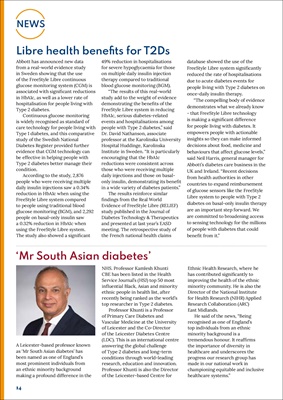
14
NEWS
Libre health benefits for T2Ds
Abbott has announced new data
from a real-world evidence study
in Sweden showing that the use
of the FreeStyle Libre continuous
glucose monitoring system (CGM) is
associated with significant reductions
in HbA1c, as well as a lower rate of
hospitalisation for people living with
Type 2 diabetes.
Continuous glucose monitoring
is widely recognised as standard of
care technology for people living with
Type 1 diabetes, and this comparative
study of the Swedish National
Diabetes Register provided further
evidence that CGM technology can
be effective in helping people with
Type 2 diabetes better manage their
condition.
According to the study, 2,876
people who were receiving multiple
daily insulin injections saw a 0.34%
reduction in HbA1c when using the
FreeStyle Libre system compared
to people using traditional blood
glucose monitoring (BGM), and 2,292
people on basal-only insulin saw
a 0.32% reduction in HbA1c when
using the FreeStyle Libre system.
The study also showed a significant
49% reduction in hospitalisations
for severe hypoglycaemia for those
on multiple daily insulin injection
therapy compared to traditional
blood glucose monitoring (BGM).
"The results of this real-world
study add to the weight of evidence
demonstrating the benefits of the
FreeStyle Libre system in reducing
HbA1c, serious diabetes-related
events and hospitalisations among
people with Type 2 diabetes," said
Dr. David Nathanson, associate
professor at the Karolinska University
Hospital Huddinge, Karolinska
Institute in Sweden. "It is particularly
encouraging that the HbA1c
reductions were consistent across
those who were receiving multiple
daily injections and those on basalonly
insulin, demonstrating its benefit
in a wide variety of diabetes patients."
The results reinforce similar
findings from the Real World
Evidence of FreeStyle Libre (RELIEF)
study published in the Journal of
Diabetes Technology & Therapeutics
and presented at last year's EASD
meeting. The retrospective study of
the French national health claims
database showed the use of the
FreeStyle Libre system significantly
reduced the rate of hospitalisations
due to acute diabetes events for
people living with Type 2 diabetes on
once-daily insulin therapy.
"The compelling body of evidence
demonstrates what we already know
- that FreeStyle Libre technology
is making a significant difference
for people living with diabetes. It
empowers people with actionable
insights so they can make informed
decisions about food, medicine and
behaviours that affect glucose levels,"
said Neil Harris, general manager for
Abbott's diabetes care business in the
UK and Ireland. "Recent decisions
from health authorities in other
countries to expand reimbursement
of glucose sensors like the FreeStyle
Libre system to people with Type 2
diabetes on basal-only insulin therapy
are an important step forward. We
are committed to broadening access
to sensing technology for the millions
of people with diabetes that could
benefit from it."
'Mr South Asian diabetes'
A Leicester-based professor known
as 'Mr South Asian diabetes' has
been named as one of England's
most prominent individuals from
an ethnic minority background
making a profound difference in the
NHS. Professor Kamlesh Khunti
CBE has been listed in the Health
Service Journal's (HSJ) top 50 most
influential Black, Asian and minority
ethnic people in health list, after
recently being ranked as the world's
top researcher in Type 2 diabetes.
Professor Khunti is a Professor
of Primary Care Diabetes and
Vascular Medicine at the University
of Leicester and the Co-Director
of the Leicester Diabetes Centre
(LDC). This is an international centre
answering the global challenge
of Type 2 diabetes and long-term
conditions through world-leading
research, education and innovation.
Professor Khunti is also the Director
of the Leicester-based Centre for
Ethnic Health Research, where he
has contributed significantly to
improving the health of the ethnic
minority community. He is also the
Director of the National Institute
for Health Research (NIHR) Applied
Research Collaboration (ARC)
East Midlands.
He said of the news, "Being
recognised as one of England's
top individuals from an ethnic
minority background is a
tremendous honour. It reaffirms
the importance of diversity in
healthcare and underscores the
progress our research group has
made in our national work in
championing equitable and inclusive
healthcare systems."